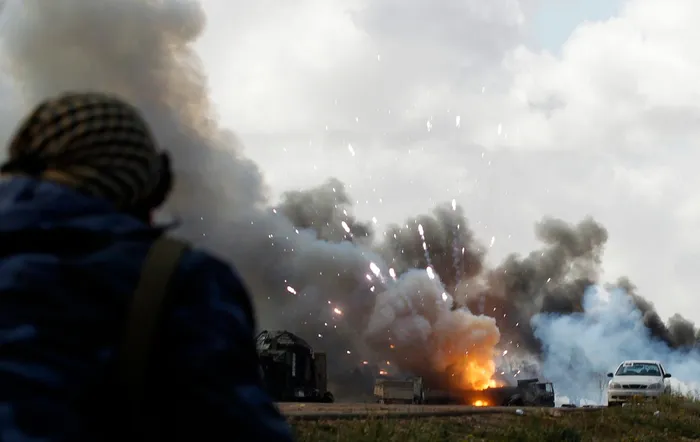‘US military adventures jeopardising global security’

Picture: REUTERS – A rebel fighter looks at a burning vehicle belonging to forces loyal to Libyan leader Muammar Gaddafi after an air strike by coalition forces along a road between Benghazi and Ajdabiya on March 20, 2011. European and US forces unleashed missiles on the day against Gaddafi’s forces in the biggest Western military intervention in the Arab world since the 2003 invasion of Iraq.
By Dr Sizo Nkala
Much has been said about Russia and China’s apparent disregard for international law and norms undermining global security and stability.
Russia’s annexation of Crimea in 2014 and its conflict in Ukraine earlier this year has earned it the label of a pariah state in the West. China has been called a revisionist power bent on undermining international law due to its activities in the Indo-Pacific, in global platforms and in regions like Africa. The Western countries have wasted no time in assuming the role of high priests of international law.
However, less is being said and written about how the US has led the assault on international law that holds together the state system governing the relations between states, by embarking on unilateral military ventures that violate the sovereignty of other states. The first two decades of the 21st century have seen the US arrogantly throw its military might around, under the aegis of the so-called “War on Terror”, often with catastrophic consequences for the victimised countries and global security more broadly.
The first of the American misadventures came when the US government invaded Afghanistan in October 2001, just weeks after the 9/11 attacks. The US claimed that the Taliban government in Afghanistan was harbouring the Osama bin Laden-led terrorist outfit, al-Qaeda who masterminded the 9/11 attacks in New York. The war was a unilateral venture that was not sanctioned by the UN as per the requirements of international law.
The Taliban government was toppled within weeks, with most of its leaders either killed or in hiding. The US and its allies immediately seized and took control of key cities. A US-backed Afghan Interim Authority was set up to govern the country. After its initial success, the US decided to keep its army in the country to prevent a possible revival of al-Qaeda. The US forces would remain in Afghanistan for 20 years. They pulled out in August last year, leaving a trail of destruction and death.
According to the Costs of War Project, more than 46,000 civilians were killed in Afghanistan and Pakistan while more than two million Afghans were displaced. A third of the Afghan population was believed to have suffered malnutrition as a result of the conflict. The war cost the US more than $1 trillion directly, and a couple of trillions more in the medical costs of the injured soldiers. The US-backed Afghan government fell to the Taliban forces just a month after the US forces withdrew, plunging the country into instability.
In its second misadventure, the US declared war on Iraq and invaded the country in March 2003, after accusing Saddam Hussein of possessing weapons of mass destruction. Again, the war was a unilateral decision without the backing of the international community, except US allies like Britain. After numerous air strikes followed by a ground invasion, the Iraqi army capitulated by April 2003, leading to the fall of the government.
Almost a year into that war, the US government admitted that its claims of the presence of chemical, biological and nuclear weapons in Iraq were wrong. The US troops withdrew from Iraq in 2011, bringing the nine-year war to an end, with more than 100,000 people having been killed and millions more displaced. The war left a devastated country with a weak government and sectarian divisions that continue to destabilise Iraq and the Middle East.
The third ill-conceived military intervention involved the US-led Nato which launched an attack on Libya in 2011, following the Arab Spring clashes between the government forces and protesters across Libyan cities. The intervention went ahead despite opposition from the AU. With the backing of the Nato’s no-fly zone and targeted air strikes, the rebels seized significant territory from Muammar Gaddafi’s forces, leading to the collapse of his government. The National Transitional Council (NTC) took over and became the internationally recognised Libyan government.
However, more than a decade after assuming power, the NTC has struggled to quell instability in the country, with fighting still going on. The military adventures of the US in Afghanistan, Iraq, and Libya have left the world in a worse state in terms of global security. While the stated objective of the War on Terror was to create strong states in countries deemed to be granting sanctuary to terrorist networks, the opposite was achieved. By smashing strong and viable states in Afghanistan, Iraq and Libya and failing to rebuild them, the US and its allies have created more terrorist havens, thus jeopardising global security.
Moreover, the US military interventions have left dangerous precedents of unilateral militarism. The interventions succeeded only in demonstrating that multilateralism and international law cannot stand in the way of the narrow interests of a country that has adequate military might. Hence, as the self-righteous West castigates Russia over its military operations in Ukraine and China, over its military drills in the South China Sea, it should be reminded that it sets the example.
Nkala is a research fellow at the University of Johannesburg’s Centre for Africa-China Studies